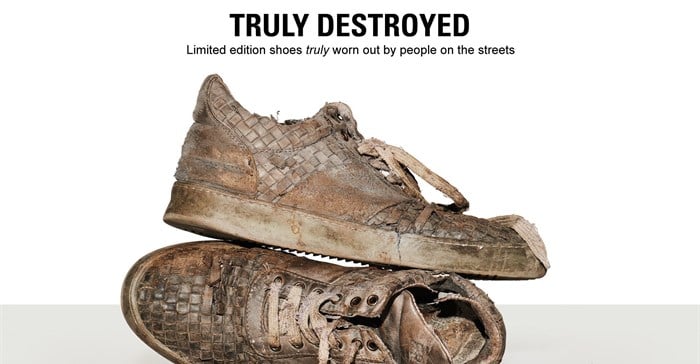When luxury fashion house Balenciaga recently launched its Paris Sneaker collection, which features 100 pairs of limited-edition 'fully destroyed' sneakers that cost $1,850, the Salvation Army hijacked the conversation to highlight the plight of homeless people in the Netherlands.

Supplied. Cloudfactory and The Dutch Salvation Army ReShare – inspired by Balenciaga – created a collection of truly destroyed shoes from people living on the streets
The release of these sneakers – the less-destroyed, prêt-à-porter version cost $625 – caused quite a stir on social media. The essence, as someone wrote: ‘These sneakers are simultaneously insulting the rich while mocking the poor.’
Fairly or unfairly, it did lead to trulydestroyed.com; a website inspired by Balenciaga’s campaign, but in this case, the limited edition shoes have been worn out for years by people living on the streets, giving them a worn-out aspect that is not treated, but as real as their living conditions.
Each pair of truly lived-in shoes is unique and comes in the shoe size of the homeless person who wore them, together with a product description that gives insight into how the shoes got to their truly destroyed state.
Shifting the conversation
The original idea to use this big fashion drop to steer the conversation came from Amsterdam-based creative agency, Cloudfactory.
“We have a lot of respect for Demna Gvasalia’s vision, the creative director of Balenciaga, and what he is doing with the Balenciaga brand – they often tap brilliantly into (pop) culture. We understand the fashion world has its codes, and we are not here to judge them,” explains creative director Julio Álvarez.
If anything, Álvarez says they are thankful Balenciaga decided to come up with the limited-edition sneakers described as “totally destroyed”.
“That’s what sparked our idea: selling used sneakers worn by people living in the streets. Not treated to look destroyed, but truly destroyed, due to their tough living conditions. It gives us a nice springboard to bring a tougher reality to the news,” says Álvarez
Creative director César García adds: ‘The situation of homeless people is not trendy, nor newsworthy. It’s getting somewhat better, but The Salvation Army ReShare still has to fight for more attention and help to solve and prevent homelessness."
“When a brand like Balenciaga decides to make extremely worn-out sneakers trendy, we had to jump at the opportunity.
“It’s about hijacking the conversation and trying to get a meaningful message across. Not at the expense of Balenciaga, but with thanks and respect to them – building on the shoulders of giants,” explains García
The stories behind the shoes
Well-known Dutch fashion photographer Carli Hermès shot the real destroyed shoes of the homeless.
“I’m not against Balenciaga’s destroyed sneakers at all. They did a great job grabbing everyone’s attention,” says Hermès.
“But when I can help the homeless – the number seems to be rising again – with such a wonderful idea, I’m in.
“I like the story behind it. For me, this is not only about photography but also about art direction. The idea is strong and therefore I could develop the idea further in photography,” Hermès adds.
He adds that it would be (very) nice if we can make consumers and people in the fashion industry aware of this “activist” campaign. “And hopefully more than that: have them act on it, spend a little less on clothes, shoes and living and, instead, donate to The Salvation Army.”
Attention towards the homeless
“Of course, the fashion world is all about how clothes and shoes look. The creativity and variety that comes with it can be wonderful, as is high fashion, or Balenciaga for that matter.
“However, it is also sometimes at odds with what clothing means to most of the people we deal with, and that is purely functional.
“The destroyed shoes of a homeless person opposite the high-fashion products of this fashion industry literally and symbolically reflect the inequality in the world,” says Thamar Keuning, marketing & communications at The Salvation Army ReShare, Leger des Heils ReShare in The Netherlands.
It is a good thing that the conversation is shifted in this way from a fashion stunt and fuss to a real social problem, such as the large number of homeless people in the Netherlands - at the moment, there are 32,000.
“We have been advocating for years for housing homeless people and the prevention of homelessness. It is nice to see that through actions like this, the subject is finally getting the international attention it deserves,” says Keuning












